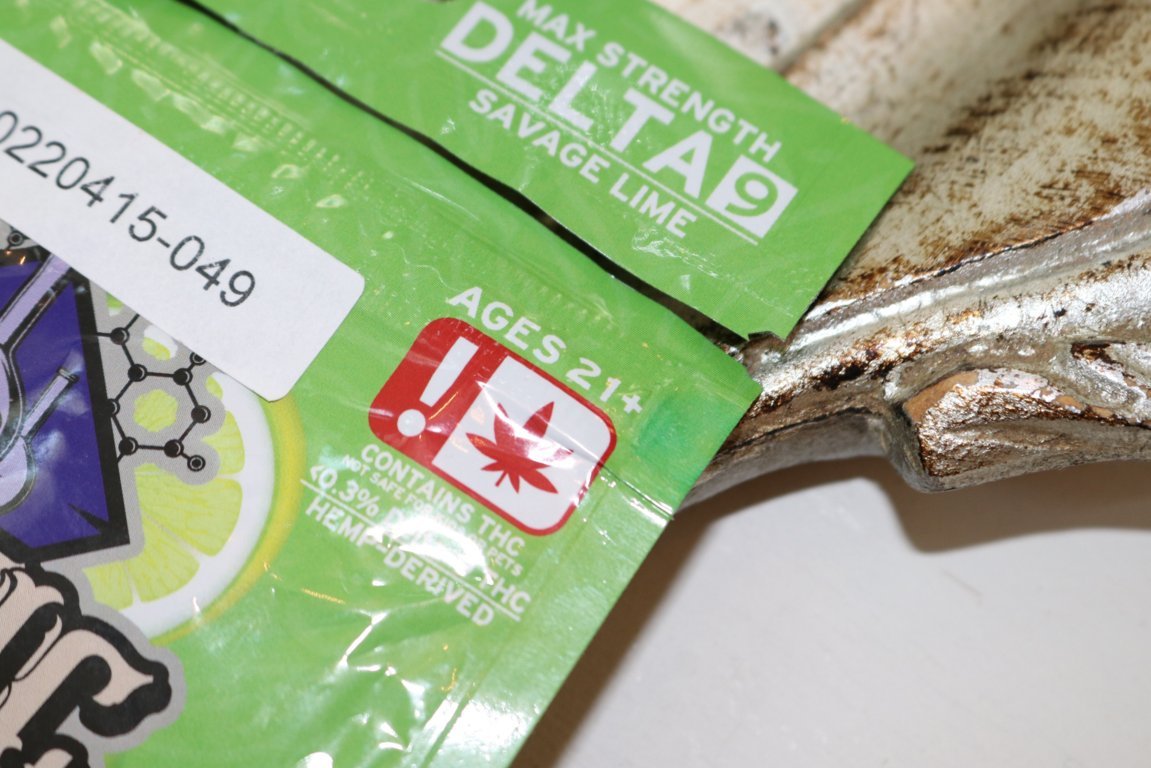CBD Gummies
How Long Do Delta 9 Gummies Stay in Your System?

Delta 9 tetrahydrocannabinol, commonly known as delta 9 THC, is a psychoactive compound derived from the cannabis plant. Unlike marijuana which contains varying ratios of THC and CBD, delta 9 THC gummies are produced solely from hemp and contain only delta 9 THC as the active ingredient.
Delta 9 THC gummies have exploded in popularity recently due to their legality under the 2018 Farm Bill and their ability to provide a mild “high” similar to marijuana. But how long do the effects and detectable traces of these THC gummies actually last in your body? This guide will examine how delta 9 is metabolized, the timeline for feeling high, and how long it can be detected in drug tests.
Onset and Duration of Delta 9 Effects
When you ingest a delta 9 gummy, the THC is absorbed through the stomach and intestines. This absorption process takes a bit longer compared to smoking or vaping THC, which causes more immediate effects. With edibles, it takes about 30 minutes to 2 hours before you begin feeling the effects of delta 9 THC.
Once the high sets in, delta 9 gummies generally produce effects that peak around 2-4 hours after ingestion. The duration of effects lasts about 4-6 hours in total before beginning to taper off. Of course, the exact timing depends on factors like your metabolism, age, weight, and tolerance. Those new to THC may feel effects for a shorter timespan.
This delayed onset is important to keep in mind so you don’t consume more gummies prematurely. The effects take time to kick in but last considerably longer than other consumption methods. Consuming more gummies too soon can lead to an uncomfortably strong high.
Metabolism and Excretion of Delta 9 THC
To understand how long delta 9 THC stays in your system, it’s important to look at how the compound is metabolized and excreted from the body.
When you ingest delta 9 THC, it is absorbed into the bloodstream where it travels to the brain and exerts its mind-altering effects. Excess THC not used by the brain is transported to the liver, where enzymes work to break it down and convert it into different byproducts.
Specifically, the liver converts delta 9 THC into a compound called 11-hydroxy-THC. 11-hydroxy-THC is considered even more potent than delta 9 THC in terms of its psychoactive effects. The liver then further metabolizes these compounds into various non-psychoactive molecules like THC-COOH.
THC-COOH is the primary metabolite screened for in cannabis drug tests. This is because it has a longer half-life than delta 9 THC and stays in the system long after the buzz wears off. The THC metabolites are excreted from the body in both urine and feces. Traces can also be deposited into hair follicles and remain there for months.
Elimination Half-Life of Delta 9 THC
The elimination half-life is the time it takes for levels of a substance in the body to become reduced by half. For delta 9 THC, studies show the half-life averages around 20-30 hours. But the half-life can vary quite a bit based on the individual and frequency of use.
Chronic heavy users of cannabis tend to exhibit longer half-lives. One study found the half-life of THC in heavy users was 4.3-5.3 days compared to just 1.3-1.4 days in occasional users. The body seems to adapt to frequent THC exposure by slowing down the elimination process. Age of user also plays a role, with studies showing elderly individuals over 65 may have THC half-lives over 53 hours.
With an average half-life of 1-2 days, it takes approximately 3-7 days for complete elimination of detectable delta 9 THC metabolites. However, low concentrations may remain in some tissues like fat for even longer.
Detection Windows for Delta 9 THC Drug Tests
Drug testing is the best way to determine exactly how long delta 9 THC remains detectable in your system after consuming gummies. There are several different types of drug tests that analyze different biomarkers and bodily fluids. Each test has its own particular detection window.
Blood Tests
Blood tests measure the actual concentration of delta 9 THC in the bloodstream rather than metabolites. Since THC rapidly leaves the blood, it can only be detected in blood for around 12-24 hours after ingesting delta 9 gummies.
Chronic heavy users may show THC in blood for up to a week if they consume edibles frequently. A positive blood test indicates very recent use of THC.
Urine Tests
Urine tests look for the metabolite THC-COOH and are the most common type of cannabis screening. Standard urine tests can detect THC-COOH for approximately 3-15 days after last use.
Factors like hydration levels and frequency of use impact the duration. Chronic daily users can test positive for THC-COOH in urine for 1-2 months after stopping.
Hair Tests
Hair follicle testing offers the longest window of detection for THC metabolites. Trace amounts become lodged in the hair shaft and remain detectable for up to 90 days. Hair tests do not measure intoxication level but rather ingestion over the last few months.
Hair tests are relatively expensive and invasive. Most employers and drug courts opt for cheaper urine testing. But hair testing can identify delta 9 THC gummy use even long after effects have worn off.
Saliva Tests
Saliva or oral fluid testing detects the parent drug delta 9 THC itself within saliva. This means detection periods are shorter, in the realm of 1-10 days after last use. Saliva testing is not very common but may be used in certain law enforcement situations like roadside screening.
Factors that Influence Duration of Detectability
Many variables can influence how long delta 9 THC remains detectable in the body. These include:
- Use Frequency – Frequent and chronic users accumulate more THC by-products in fat tissues and eliminiate them slower than occasional users. The more often gummies are consumed, the longer THC sticks around.
- Metabolism – Individuals with faster metabolisms eliminate THC metabolites quicker than those with slow metabolisms. Age, diet, activity level and genetics dictate metabolic speed.
- Body Fat – THC accumulates in fatty tissues and organs like the liver, spleen, heart and lungs. Those with higher body fat retain THC longer.
- Fluid Intake – Well hydrated individuals dilute THC metabolites in urine, shortening detection times. Dehydration leads to concentrated urine with more detectable THC traces.
- Dose Size – Ingesting higher doses results in greater THC levels. More THC takes longer to clear from the body than lower doses.
- Product Type – Different delta 9 products influence results. Gummies tend to have longer lasting effects than vapes or tinctures. Full-spectrum hemp can add CBD and extend high duration.
Tips for Passing a Drug Test
Those who need to take a drug test but recently used delta 9 gummies should be aware that metabolites may remain for over a week in urine. Here are some tips that may help you pass:
- Abstain from Use – Stop using THC gummies a minimum of one week before any anticipated drug test. The longer you abstain, the better.
- Dilute Urine – Drinking extra fluids before your test will dilute urine THC metabolites. B vitamins can add color to clear pee.
- Urinate Frequently – Get rid of excess THC remnants by peeing multiple times before your test. Mid-stream urine is ideal.
- Consider Detoxifiers – Products like powders, drinks and pills claim to accelerate THC removal, but scientific evidence is lacking regarding effectiveness.
- Substitute Urine – Synthetic urine kits provide drug-free and biochemically valid urine. But labs often check for authenticity.
- Hair Detoxification – Special shampoos and treatments purport to remove THC from hair before follicle testing. However, most evidence indicates these do not work.
The only guaranteed way to pass a drug test is to abstain from delta 9 THC use for as long as possible before testing. There are no foolproof methods to quickly clear THC from the system.
Conclusion
Delta 9 THC gummies offer a legal and accessible way to enjoy cannabis effects. However, the long half-life and detection windows can catch some users off guard. It takes around 1-7 days for delta 9 THC to become fully eliminated from the body after ingesting gummies. However metabolites may remain detectable in urine for over two weeks. Hair follicle testing provides the longest window of detection at up to 90 days. Those wanting to pass a drug test should quit using THC gummies at least one week in advance. Understanding the metabolism and elimination profile of delta 9 THC can help gummy consumers use them responsibly.

